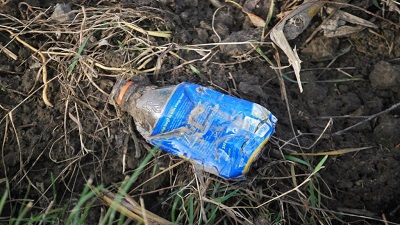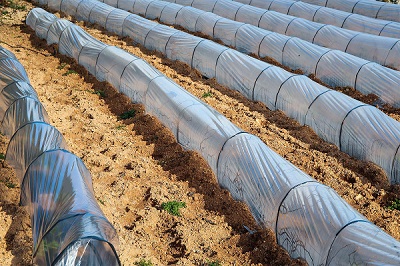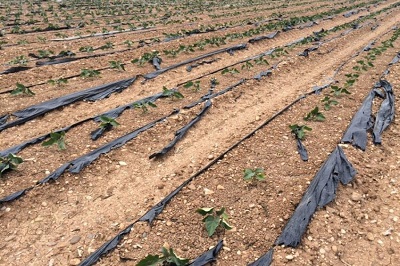Farming South Africa Plastic Pollution
Farming in South Africa faces challenges related to plastic pollution, as in many parts of the world. Plastic pollution can affect agricultural land, water sources, and ecosystems, posing risks to both the environment and human health.
- Plastic Mulching: Many farmers use plastic mulch films to improve soil moisture retention, control weeds, and enhance crop growth. However, improper disposal or management of these plastics can lead to pollution. Some farmers are adopting biodegradable mulch films or alternative mulching techniques to mitigate this issue.
- Plastic Waste: Plastic waste from agricultural activities, such as packaging materials, irrigation pipes, and chemical containers, can accumulate on farms. Improper disposal of these items can contaminate soil and water sources, affecting both crop productivity and environmental health.
- Microplastics: Microplastics, tiny plastic particles less than 5mm in size, can result from the breakdown of larger plastic items or from the use of products containing microplastics, such as certain fertilizers and pesticides. These microplastics can leach into soil and water, potentially harming soil organisms, aquatic life, and human health.
- Water Pollution: Plastic pollution can also affect water sources essential for farming, such as rivers, streams, and groundwater. Plastic debris can block irrigation channels, contaminate water supplies, and harm aquatic ecosystems, disrupting the balance of ecosystems that support agriculture.
Addressing plastic pollution in South African farming requires a multifaceted approach involving government regulations, industry initiatives, and farmer education. Strategies may include promoting recycling and proper waste management practices, incentivizing the use of biodegradable materials, and raising awareness about the environmental impacts of plastic pollution. Collaborative efforts involving farmers, policymakers, scientists, and environmental organizations are essential to effectively tackle this issue and ensure sustainable agriculture in South Africa.

Plastic Mulching
Plastic mulching is a widely used agricultural practice in South Africa and around the world. It involves laying plastic films or sheets over the soil surface in crop fields to achieve various benefits:
- Weed Control: Plastic mulch suppresses weed growth by blocking sunlight from reaching weed seeds germinating in the soil. This reduces the competition for nutrients, water, and sunlight between weeds and crops, leading to improved crop yields.
- Soil Moisture Conservation: Plastic mulch helps to reduce water evaporation from the soil, thus conserving soil moisture. This is particularly beneficial in regions with limited rainfall or during dry seasons, where it can help maintain soil moisture levels necessary for optimal crop growth.
- Temperature Regulation: Plastic mulch can moderate soil temperature by reducing temperature fluctuations. It absorbs and retains heat during the day, warming the soil, and releases it at night, helping to maintain more stable soil temperatures. This is especially advantageous for crops sensitive to temperature variations.
- Improved Crop Quality: Plastic mulch can enhance crop quality by providing a clean surface for fruits and vegetables to grow on, reducing contact with soil, and preventing soil-borne diseases. It also helps to keep produce clean, reducing post-harvest losses and improving marketability.
However, plastic mulching also presents environmental challenges, particularly related to plastic pollution. At the end of the growing season, plastic mulch must be removed and properly disposed of to prevent environmental contamination. Improper disposal can lead to soil and water pollution, harm wildlife, and degrade ecosystems.
To mitigate these issues, alternatives to conventional plastic mulch, such as biodegradable mulch films made from natural materials like corn starch or cellulose, are being developed and adopted by some farmers. These biodegradable mulches break down into non-toxic components over time, reducing the need for manual removal and minimizing environmental impact.
While plastic mulching offers several benefits for agricultural production, sustainable practices and environmental considerations are essential to ensure its long-term viability and minimize adverse impacts on the environment.
Plastic Waste
Plastic waste is a significant environmental challenge in South Africa, impacting various sectors, including agriculture. Here’s how plastic waste affects agriculture in the country:
- Land Contamination: Improper disposal of plastic waste, such as packaging materials, irrigation pipes, and chemical containers, can lead to land contamination on farms. Plastic debris not only detracts from the visual appeal of agricultural landscapes but can also interfere with farming operations and harm soil health.
- Soil Degradation: Plastics do not biodegrade easily and can persist in the environment for hundreds of years. When plastic waste accumulates in agricultural fields, it can degrade soil quality by preventing water infiltration, inhibiting root growth, and altering microbial activity. This degradation can reduce crop productivity and agricultural sustainability over time.
- Water Pollution: Plastic waste from agricultural activities can contaminate water sources, including rivers, streams, and groundwater. Plastic debris can leach harmful chemicals into waterways, disrupt aquatic ecosystems, and pose risks to human health. Moreover, plastic pollution can clog irrigation channels and drainage systems, affecting water management practices on farms.
- Livestock Health: Plastic waste on farms can pose health risks to livestock if ingested. Animals may accidentally consume plastic debris while grazing, leading to digestive issues, blockages, or toxicity. Additionally, plastic pollution in animal feed or water sources can introduce contaminants into the food chain, impacting both animal and human health.
To address plastic waste in agriculture, South Africa has implemented various initiatives, including waste management policies, recycling programs, and public awareness campaigns. Additionally, sustainable agricultural practices, such as reducing plastic usage, promoting eco-friendly alternatives, and implementing proper waste disposal techniques, can help mitigate the environmental impacts of plastic waste on farms. Collaborative efforts involving government agencies, agricultural stakeholders, and local communities are essential to effectively manage plastic waste and ensure the long-term sustainability of agriculture in South Africa.
Microplastics
Microplastics, small plastic particles less than 5 millimeters in size, are a growing concern in South Africa and globally due to their pervasive presence in the environment. Here’s how microplastics can affect agriculture in South Africa:
- Soil Contamination: Microplastics can accumulate in agricultural soils through various pathways, including the application of sewage sludge or compost containing microplastics, the breakdown of larger plastic debris, and the use of plastic mulch films in farming. Once in the soil, microplastics can persist for long periods, potentially affecting soil health and fertility.
- Crop Uptake: Studies have shown that certain crops have the ability to take up microplastics from the soil, potentially leading to the presence of microplastics in edible parts of plants. While the health implications of consuming crops contaminated with microplastics are still being studied, there are concerns about the potential transfer of microplastics to the food chain and human health risks.
- Water Pollution: Microplastics can also enter agricultural water sources, such as rivers, lakes, and irrigation canals, through various pathways, including runoff from agricultural fields, wastewater discharge, and atmospheric deposition. Once in water bodies, microplastics can be ingested by aquatic organisms, potentially leading to bioaccumulation and biomagnification in the aquatic food chain.
- Ecosystem Impacts: Microplastics in agricultural environments can impact soil and aquatic ecosystems, potentially altering microbial communities, nutrient cycling processes, and overall ecosystem functioning. Additionally, microplastics can have adverse effects on soil-dwelling organisms, such as earthworms and microorganisms, which play crucial roles in maintaining soil health and fertility.
Addressing the issue of microplastics in agriculture requires a multifaceted approach, including:
- Conducting research to better understand the sources, pathways, and impacts of microplastics in agricultural environments.
- Implementing measures to minimize the release of microplastics into the environment, such as reducing plastic usage, improving waste management practices, and promoting the use of biodegradable alternatives.
- Developing and implementing monitoring programs to assess the presence of microplastics in agricultural soils, water sources, and crops.
- Raising awareness among farmers, policymakers, and the public about the potential risks associated with microplastics in agriculture and the importance of adopting sustainable practices to mitigate these risks.
proactive steps to address the issue of microplastics in agriculture, South Africa can help safeguard the health of its agricultural ecosystems, protect food security, and promote sustainable farming practices.

Water Pollution
Water pollution is a significant environmental issue in South Africa, with diverse sources and impacts on agriculture and ecosystems. Here are some key points regarding water pollution in the country:
- Industrial and Mining Activities: South Africa’s industrial and mining sectors contribute to water pollution through the discharge of pollutants such as heavy metals, chemicals, and sediment into water bodies. These pollutants can contaminate surface water and groundwater, affecting aquatic ecosystems and posing risks to human health.
- Agricultural Runoff: Agricultural activities, including the use of fertilizers, pesticides, and animal waste, contribute to water pollution through runoff. Excess nutrients such as nitrogen and phosphorus from fertilizers can lead to eutrophication, harmful algal blooms, and oxygen depletion in water bodies. Pesticides and herbicides can also contaminate water, harming aquatic organisms and biodiversity.
- Wastewater Discharge: Inadequate sanitation infrastructure and wastewater treatment facilities result in the discharge of untreated or inadequately treated sewage into water bodies. This raw sewage contains pathogens, nutrients, and other pollutants, contaminating water sources and increasing the risk of waterborne diseases.
- Plastic Pollution: Plastic pollution is a growing concern in South Africa’s water bodies, with plastics entering rivers, streams, and oceans from various sources, including littering, inadequate waste management, and runoff from urban and agricultural areas. Plastics degrade slowly and can harm aquatic organisms, disrupt ecosystems, and accumulate toxic chemicals.
- Mining Contamination: South Africa’s mining activities, particularly in areas with extensive mineral deposits like gold and platinum, have resulted in water pollution due to acid mine drainage (AMD) and the release of heavy metals and other contaminants into waterways. AMD occurs when sulfide minerals in mine tailings react with air and water, producing sulfuric acid and metal ions that can contaminate water sources.
Water pollution in South Africa, efforts are underway to improve water quality monitoring, enforce environmental regulations, enhance wastewater treatment infrastructure, promote sustainable agricultural practices, and raise public awareness about the importance of protecting water resources. Collaboration between government agencies, industries, communities, and environmental organizations is crucial to effectively mitigate water pollution and ensure the sustainable management of water resources in the country.
YouTube Channel: Farming South Africa
Facebook Page: Farming Life
Back To Home Page: Farming South Africa

